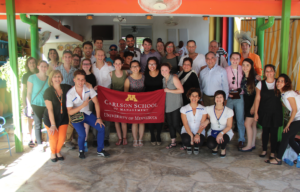8. Carlson in Cuba and Other Global Initiatives

The Carlson Entrepreneurship in Cuba class March 2016. Courtesy photo
When the Obama administration lifted restrictions on Cuba, much of the business world drooled at the potential of the emerging market a little more than 100 miles from Florida’s Keys. And a few B-schools didn’t waste any time getting their students on the island. Schools planning student trips to Cuba this academic year include Miami University’s Farmer School of Business, the University of Minnesota’s Carlson School of Management, and the University of Georgia’s Terry College of Business. While it will be Georgia Terry’s first trip this March, both Miami’s Farmer and Minnesota’s Carlson took students last academic year. Miami’s Farmer School was filled to capacity and Minnesota Carlson brought 28 students to island.
“I’ve never seen a more excited group of students,” says Steve Spruth, senior lecturer in Carlson’s strategic management and entrepreneurship department. He told Poets&Quants that “they could barely sit in their seats the first day of class, which is rare. That tells me that we’ve created this experience that people realize is hard for them to have on their own. You want to say you were in Cuba before it changed.”
Of course, this is just one example among undergraduate business programs. Another recent innovation comes from Georgetown’s McDonough School in the Global Business Experience and Global Business Fellows Program. Through the Global Business Experience, students work on real-life consulting projects for international companies. The school’s Global Business Fellows Program is the first-ever joint program with another Georgetown college — the School of Foreign Service. The joint program equally threads business development and international affairs.
9. Professional Development & Career Management

Indiana University Kelley School of Business Career Services Director, Susie Clarke (far right) and her team at a Habitat for Humanity volunteer build day. Photo courtesy of Kelley School of Business
The secret to those remarkably impressive employment rates at the best undergraduate business programs is simple: Substantial investment in career management support. Most undergraduate programs pay little attention to professional development. Students rarely have career coaches or mentors. Little effort is made to attract potential employers to campus to recruit students. The result: Most grads are left to fend for themselves when it comes to getting a job after graduation.
The opposite is true at the better undergraduate business schools. Still, there are good career management and then there are world class efforts that set a new standard in making sure that no one falls between the cracks. At the Kelley School of Business at Indiana University, a program called Kelley Compass brings up this process by several notches. Students are required to take a class per year during their first three years. The first alone is a 15-week course that helps students create their own personal brands to better present themselves to potential employers. Students are required to research majors in a way that helps them discover what they really want to achieve in an early career. They interview professionals, analyze corporate cultures, and build a professional network long before they put on their cap and gown.
More than just showing students how to create a professional resume, Kelley Compass teaches students how to research companies to find their fit with an ideal employer, even how to ask relevant and meaningful questions of professionals. By the third module in their junior year, students are taught how to plan, propose, carry out and reflect on a substantial project that impacts others—the kind of project that makes for a deeper conversation in a job interview.
Yet, Kelley Compass is just one element of the puzzle. Every student is assigned a career advisor who works with students during all four years. More than 5,400 coaching appointments were facilitated by the career services staff during 2015-16. That doesn’t even count the 64 career programs that attracted 4,000 attendees In the past academic year. In 2015-2016, the school’s career services office brought to campus nearly 300 companies who conducted more than 8,000 interviews with Kelley undergrads. More than 1,200 employers posted jobs or hosted virtual interviews through the undergraduate career services office.
The bottom line? Internships were reported by 94% of the students in the Class of 2017 who were actively engaged in an internship search this year. Some 95% of graduating seniors who found full-time employment three months after commencement or went to graduate school. It was the fifth consecutive year in which the school has seen more than 93% of seniors who have successfully reach their desired goal.The average starting salary for 2016 Kelley graduates was an impressive $60,600..
DON’T MISS: POETS&QUANTS’ BEST UNDERGRADUATE BUSINESS PROGRAMS OF 2016 or B-SCHOOLS THAT CREATE THE BEST COLLEGE EXPERIENCES











Questions about this article? Email us or leave a comment below.